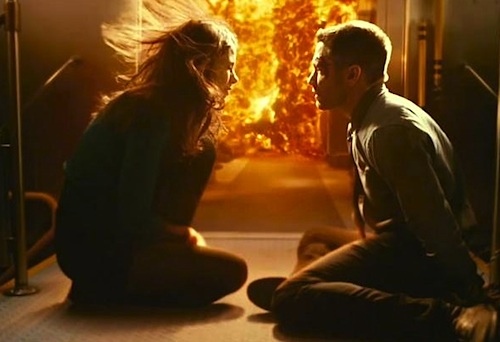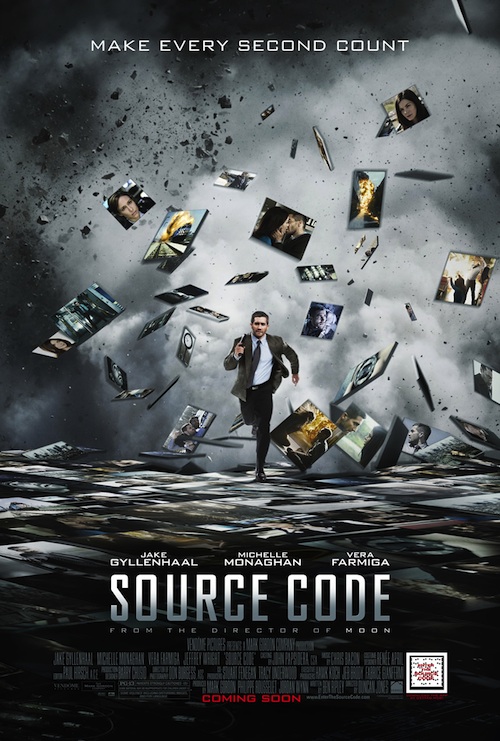
This film is something of an anomaly. A fast-paced thriller with intelligence and heart, made within the Hollywood studio system. Has it been compromised, or did the filmmakers’ Indie mindset make it intact?…
In an alternate universe, “Source Code” is a terrible movie.
The combination of rewind-and-repeat plotline and mind-bogglingly esoteric theoretical physics dangerously treads the razor’s edge between brilliance and bullshit. Fortunately, in our universe, we have the son of singer David Bowie steering the film closer to the former category.
In what is only his second directorial effort, Duncan Jones has exercised considerable maturity over the tricky subject matter to give us a superb, thinking man’s sci-fi that still delivers a steady dose of adrenaline. And like all the best science-fiction stories, “Source Code” is more interested in the human condition rather than huge spectacle, although it’s no slouch in the latter department.
But be advised, this is a film that will divide audiences. And your ultimate opinion of it greatly depends on whether you can do two things. One, you have to be able to buy into the quasi-scientific mumbo-jumbo expounded here. It’s a big thing to ask of the audience, especially when the time-travel concepts end up raising more questions than the script is willing (or able) to answer. It can leave you reaching. Two, you have to accept the narrative backtracking as an essential part of the viewing experience. Or you might find yourself highly annoyed. Once that happens, anything else the film has to offer (and it has a lot) will be rendered irrelevant.
“Source Code” is essentially “Groundhog Day” meets “Quantum Leap”. In the Bill Murray comedy classic, a man is forced to relive the same day over and over again. Here, Jake Gyllenhaal plays a soldier, Capt Colter Stevens, who is unwittingly made the subject of an experimental new technology that can send him into the past to inhabit the body of another person (ala “Quantum”) but for only 8 minutes at a time. His mission is to find the person who planted a bomb on a city-bound commuter train. The train bombing already happened, so Stevens is told he can’t prevent any of the deaths on board. But if he identifies the bomber, he will prevent another much larger nuclear bomb from destroying Chicago.
The technology allows Stevens to keep going back as many times as it takes in order to solve the mystery. Here’s where some viewers will find the repetition tiresome. Like “Groundhog”, he experiences the same things with each revisit: spilt coffee, rude passengers, and the same conversation with a girl his inhabited alter ego Sean Fentress has a crush on. On a narrative level it might seem wasteful to keep covering old ground. Some would say: “Just get on with it!”
Unlike other deja vu films however, every time Stevens goes back, things are slightly different. Armed with the prior knowledge of past cycles, his new reactions to the people and events around him create variations every time. That’s because Stevens is not revisiting the same 8 minutes in the past; they are all totally separate tangents of reality. Parallel universes that are all similar but different. Based on that concept, nothing is actually repeated exactly as before, and while each trip inevitably features some overlap, there is a definite forward movement in the plot. What it all boils down to is whether you’re willing to see the journey through in the way the filmmakers intended. Personally, I got more mileage out of it.

The repetitive structure clearly serves as a metaphor for free will versus fate. Stevens can’t escape the infinite loop of the events leading up to the explosion, but he chooses to do something about it anyway, no matter how futile. He tries to save fellow passenger Christina (Michelle Monaghan), although his superiors insist that she already died in the blast and nothing can change that. It’s a smart move by the filmmakers, as it makes Stevens’ mission much more personal.
On that note, it reminded me of “The Adjustment Bureau” (released earlier this year), which shared the theme of fighting to change the unchangeable, and was built around a romance. As with the Matt Damon/Emily Blunt love story, the chemistry between the leads here is what gives the film a genuine emotional core.
I’ve never bought Jake Gyllenhaal as a leading man. He’s always been more effective when lending support to more charismatic actors. Jones has somehow used Gyllenhaal’s slightly hapless screen persona to the film’s advantage. He’s channeled his star’s nervous energy into a vulnerable, honest performance that manages to enhance the tragic nature of the character. There are a couple of revelations late in the film that would not have been as poignant had it been played by an Alpha-male star. As it is, Gyllenhaal makes those moments truly touching without descending into sentimental slop. As for his scenes with Monaghan, she provides a nice contrast to his low-key approach. Monaghan tends to play only one type of role, the vivacious love interest. But she does it really well, bringing a lot of life and likability to a stereotype. They make a great on-screen couple.
In the smaller roles, Jones cast very capable performers and it shows. Vera Farmiga hasn’t got very much to do beyond relaying orders to Stevens from behind a desk. In some ways, that’s a hard part to act. The Oscar-nominated actress doesn’t disappoint. She invests her military officer with a quiet strength and a sense of compassion beneath the cool, calculating exterior. Jeffrey Wright fares even better. He is a delight as the scientist who invented the Source Code technology. In his hands, Dr. Rutledge is more than just the obligatory Genius Guy Who Explains How Stuff Works. He infuses his character with the air of a man completely out of touch with his own humanity, a soulless bureaucrat whose only concern is his own career advancement. Yet Wright plays it so subtly, most of the time you’ll be unsure whether to dislike him or not.
It’s a good thing the cast is so strong, because the science behind the story isn’t quite as convincing. Scriptwriter Ben Ripley knew his “time reassignment” conceit wouldn’t really stand up to scrutiny, so he wisely focused on the human aspects instead. In truth, you probably won’t care that the Matrix-like construct of the Source Code program is too far-fetched. Or that going by its own rules, the final scene makes no sense. You’ll be too invested in the people and the relationships Ripley has crafted.
There are also a lot of themes going on that transcend the main plot. The fascinating thing about “Source Code” is that it almost seems in a hurry to resolve all that sci-fi thriller stuff so that it can delve into more thought-provoking material. Jones and Ripley have used the story as a framework to hang certain big philosophical ideas. Such as the nature of existence and reality. If you’re divorced of your physical being and all you’re left with is your consciousness, are you still real and alive? Descartes would totally dig this.
What impresses me most about Duncan Jones as a filmmaker is that he understands how to use the cerebral stuff in service of what really matters: heart. His debut picture “Moon” also had intellectual depth, yet the most compelling takeout was how sorry we felt for Sam Rockwell’s character. The director’s follow-up effort presents an even more sympathetic figure in Capt Stevens. There are two powerful emotional payoffs near the end that I won’t spoil for you. You will know it when it happens. One is a simple yet cathartic moment of reconciliation. The other is a selfless gesture that culminates in a beautiful, and lasting image. Both sum up the film’s faith in humanity. And proves that science-fiction doesn’t have to be all doom and gloom to be effective.
“Source Code” is one of the year’s best genre films. At least in this universe.
Storyteller by trade and dreamer by nature, Wai has been deeply nuts about the celluloid world since the first time he discovered he could watch a story instead of reading it. But he likes writing about it. Wai goes by a single name because he likes to avoid any “Imperial entanglements” (a.k.a. “conflict of interest with the powers that be” for those of you who don?t speak Star Wars) in his employment. Plus, cool people use one-word names. He has just set up a movie website, the first of its kind in Malaysia, in an effort to foster greater filmic knowledge for the rakyat. Check out Electroshadow.

Hi LN, Jeffrey Wright pops up in the occasional Bond film as a re-imagined Felix Leiter. He also played Colin Powell in the George Bush biopic "W". He'll next be seen in the George Clooney directed film adaptation of "The Ides Of March".
And you should give "Source Code" a try. It's pretty good in my book. And certainly much better than "Deja Vu".
Welcome back, Wai.
Speaking of Jeffrey Wright, I have not seen him in movies vin the past year, or is it because I’ve been out of touch? He was superb in Angels of America.
I read up Source Code in Empire magazine. I was gonna give it a try until I remembered the Denzel Washington-Tony Scott movie called “Deja Vu”. I know they’re different but I always get confused when time travel occurs. Watching Memento nearly drove me nuts. Although I appreciated it after about 3 viewings.
How GOOD is good here?